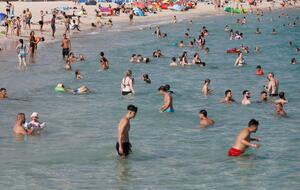The country has complained about overcrowding and a lack of affordable housing in tourist hotspots, with 94 million tourists visiting the country in 2024.
Several protests have been held in tourist hotspots such as Barcelona and Tenerife and, as a result, guidelines were put in place by local authorities for tourists to abide by.
More on those rules below.
However, the latest news from Spain is that caps are going to be put in place in the two hotspots.
The managing director of Palma de Majorca Tourism, Pedro Homar, said at the Spain Talks conference hosted by the Spanish Tourist Office in London: “Residents are our priority nowadays. We slashed marketing budgets in the last three to four years.”
Homar added: “I’m sorry for that. Limits are good. Let’s not be afraid to discuss limits.”
Mateu Hernandez, the Barcelona Tourism director general, agreed: “We’re 100% the same in Barcelona. The city began to do this – no more hotels, no more tourism flats, no more cruises, no more tour groups.
“This is not failure. This is what we’re looking for, Travel Weekly reports. We don’t want visitors to feel crowded.
“Our challenge is to answer the question – can tourism save us from tourism? This is the key question."
Speaking on the protests, he said: “It’s a minority who don’t want tourism. We want to prioritise who is sleeping on beds [in the city]. Our key priorities are conferences and events – we’re investing €400 million in infrastructure for conferences – and culture.”
Homar added: “We have a cap of 12,000 beds in the city – 95% in four and five-star hotels. We hardly have two and three-star hotels. We are positioning ourselves as more upscale and cosmopolitan. We limit daily cruises. We want to manage the destination. We’re not in the business of marketing the destination.”
Jaime Martinez, the Mayor of Palma de Majorca, insisted: “We have to control the number of visitors. We want Palma to be a reference point in the travel market.”
Tourist tax increases were announced in the Balearic Islands and Barcelona. Rates will vary depending on the quality of accommodation, with guests at four and five-star hotels paying the most in the months of June, July and August.
In Barcelona, the tourist tax is set to double with a maximum of £12.40 per person per night.
The second rule is that damaged 50 euro notes will not be accepted as the central bank are trying to withdraw damaged currency from circulation to avoid fraud.
Thirdly, in Gran Canaria, a set of rules have been put in place for what can't be done on a public beach such as cooking or using an umbrella. If these rules are broken, tourists could be fined £2,500.
Walking tours in the Mallorcan capital Palma will be limited to a group of 20 and a resident's only restriction on cars will be put in place in Sóller, Mallorca.
In January this year, a law in Malaga, Alicante, Madrid and Seville was set where no new holiday rentals can be registered across 43 districts in the area.
Lastly, in Llucmajor, Palma, Magaluf in Mallorca and Sant Antonio in Ibiza, a drinking ban has been imposed where alcoholic beverages can't be purchased from 9.30pm to 8am the next day and drinking on public roads will also be forbidden at these times.





